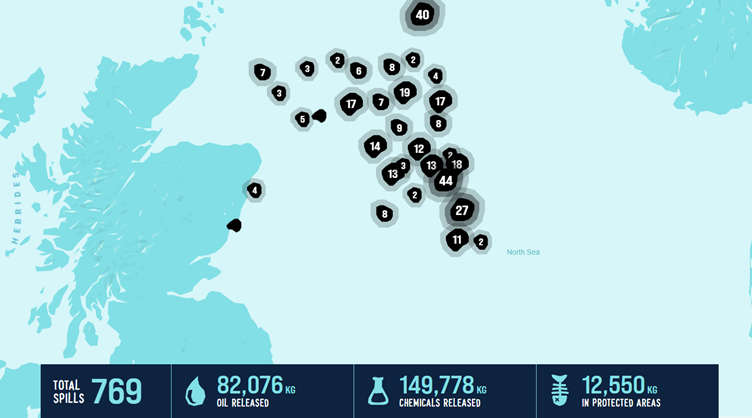Oil spill map lets public investigate the true scale of threat to UK ocean wildlife
Press Release Date: February 19, 2025
Location:
Contact:
Daisy Brickhill | email: dbrickhill@oceana.org

- UK seas suffered more than two oil or chemical spills a day last year, totalling over 82,000 kg of oil and 149,700 kg of chemicals, an interactive map created by Oceana UK has revealed.
- The map extracts live information from government databases, the first time this data has been brought together in one place.
- The largest chemical spill of 2024 was 11,170 kg and contained a biocide described as “very toxic to aquatic life with long lasting effects” in an area where porpoises have been recorded in high densities. The government did not respond to a Freedom of Information request on the spill and Oceana UK has now lodged a complaint.
A live spill map has revealed the scale of toxic pollution caused by the oil and gas industry in UK seas, for the first time bringing together data that is otherwise hidden within an opaque and misleading reporting system spread across multiple databases. Created by Oceana UK for the Ocean Alliance Against Offshore Drilling, the map allows the public to investigate individual spills to see the company responsible, check whether action has been taken by government, and raise the alarm themselves.
Toxic biocide
One chemical spill in the Alba oil field off north-east Scotland in August 2024 totalled 11,170 kg, and contained 2,800 kg of a biocide of “acute toxicity” described as “very toxic to aquatic life with long lasting effects.”[1] Minke and killer whales, white-beaked dolphin and especially high densities of the declining harbour porpoise have all been recorded in the vicinity of the field, according to government data. The spill took place just 25 km from a marine protected area.
There has been no formal investigation into this spill and the government has failed to respond to Oceana UK’s Freedom of Information request into details of any enforcement action or steps taken to address the spill. Oceana has now referred the Department for Energy Security and Net Zero to the Information Commissioner’s Office.
Wildlife forced to swim in such polluted waters come into direct contact with these chemicals and oil through the skin, when feeding, or by inhaling toxic vapours. Contamination from oil and gas developments has been shown to have a wide range of impacts, from lung disease in dolphins to cancers in seabirds and deformation and breeding disruption in fish.
Underestimate
In fact, the situation is worse even than it appears on the map, due to poor self-reporting by oil corporations Oceana warns. Nearly a third (32%) of the permit breach reports between January 21-May 24 failed to include the volume of oil – meaning true level of pollution is likely to be even higher.
Naomi Tilley, Oil & Gas Campaign Lead for Oceana UK, said: “This sickening level of toxic pollution should be headline news – yet for years, opaque reporting has meant that Big Oil have been using UK waters as an oil and chemical dump without public scrutiny. We urge everyone who cares about our ocean to use the map to help us expose this hidden outrage. Seeing the data laid out makes it crystal clear that the oil and gas industry cannot be trusted with UK seas. It’s time for government to fully implement – and make permanent – its ban on all new oil and gas.”
The majority of UK adults (71%) do not trust the regulator to ensure marine wildlife is protected from oil and gas drilling, previous polling by Oceana has shown. Enforcement is also lax, says Oceana, whose 2024 report showed that there were only two recorded convictions or fines in the last five years, one of which was just £7,000.
John Amos, CEO of SkyTruth, said: “Oceana’s map shows reported spills happening across UK waters, and the fact that even this level of pollution is an underestimate, is deeply worrying. This also tallies with everything we’re seeing through satellite imagery at SkyTruth. We’re talking about companies in an industry that is making billions in profit every year. So, the continued sloppy operations that result in chronic and persistent oil pollution are inexcusable.”
NOTES FOR EDITORS
Oceana UK is taking the government to court over the fact that exploration licences granted under the previous administration were unlawful due to a failure to consider advice from its own nature advisors, among other grounds.
